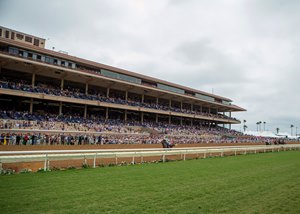Del Mar Begins Summer Meet Without Spectators July 10


In 2012, 47,339 people poured through the gates of Del Mar for the track's opening day, eager for the start of the seaside track's summer meet—part of a stretch of 20 consecutive summer openings that attracted more than 30,000 spectators.
Those crowds and their contributions to the cool track vibe will be missing due to COVID-19 when Del Mar opens for its 81st summer meet July 10. Owing to health precautions established with local and state authorities, no fans and horse owners are permitted for the afternoon's races, at least to start, though track officials are hopeful that owners may ultimately be allowed to attend later this summer. The track runs 28 days through Sept. 7, operating three days a week, Fridays through Sundays, with the exception of its closing day, Labor Day.

In the midst of the pandemic, Del Mar is one of several major tracks not allowing spectators. Belmont Park and Keeneland are running their meets without fans, and Saratoga Race Course will follow suit when it begins racing July 16. The crowds at Keeneland and Saratoga, much like Del Mar, contribute to the on-track experience.
"Like every track, and not just in America but throughout the world, everything is different, upside down," said Tom Robbins, the executive vice president of racing at Del Mar.
At least the racing should be solid, though it too is affected by the business climate amid COVID-19. The track has 38 stakes over the meet, though stakes purses are down, totaling just over $5.5 million. Last summer it ran 40 stakes worth $7.4 million.
Del Mar's Aug. 22 TVG Pacific Classic Stakes (G1) is a $500,000 race this year after being worth at least $1 million since its first running in 1991.
Despite the cuts—typical across most tracks without on-track business, leaving them reliant on simulcast and advance deposit wagering —the meet figures to draw some of the country's best horses. Maximum Security, one of the top dirt horses in the world who is now in training with Bob Baffert in California after former trainer Jason Servis was indicted on doping charges related to racing, is under consideration for the July 18 San Diego Handicap (G2). That race regularly serves as a prep for the Pacific Classic.
Another stakes race, the $100,000 Shared Belief Stakes Aug. 1, is an official qualifier for the postponed Kentucky Derby Presented by Woodford Reserve at Churchill Downs Sept. 5 and could lure Runhappy Santa Anita Derby (G1) winner Honor A. P.
The stakes action gets started with Friday's Runhappy Oceanside Stakes, a restricted $100,000 race for 3-year-olds on turf. The race is the first steppingstone in the track's 3-year-old grass series, followed by the $125,000 La Jolla Handicap (G3T) Aug. 9 and the $200,000 Del Mar Derby (G2T) Sept. 6.
The Oceanside drew 12 entrants, led by 7-2 morning-line favorite Hit the Road, the winner of the Zuma Beach Stakes last fall at Santa Anita Park and a second-level allowance optional claiming winner over older horses there May 22 in his first start at 3. The son of More Than Ready trained by Dan Blacker races for owners D K Racing, Radley Equine, Taste of Victory Stables, Rick Gold, and Dave Odmark.
Six-time Del Mar leading trainer Doug O'Neill entered two longshots in the Oceanside, Rookie Mistake and Howbeit, and six other horses on the opening-day card, giving him the most starters of any trainer on the afternoon.
"It was one of those (things) where you get the condition book, and you got one there, got one there," he said. "Everything has fallen in line in terms of placing. The key will be to be productive and to have some good results. We'll know more about that come Friday."
Eighty-seven horses were entered in 10 races Friday at Del Mar, followed by 86 entries and three also-eligibles in another 10 races July 11. However, two Saturday races drew fields of only six, one of them a maiden race for 2-year-olds.
"Right now we anticipate being a little bit softer with development of 2-year-olds that we normally would see for the summer," Robbins said. "The overall 2-year-old population in Southern California is down a bit over the previous year, or previous years. So now we anticipate that'll be a bit of a challenge. We'll try to break as many maidens as we can and maintain the program of 2-year-old races."
The track announced this summer it wanted to have 11-race programs on Saturdays to reach its goal of running 291 races, almost matching last year's 297. Before the pandemic, the track wanted to operate five days a week for a meet that would have begun a week later this summer.
In an effort to recruit horses to California, which has faced short fields at times in recent years, Del Mar has continued its "Ship and Win" program, which provides financial bonuses to horses coming to race from out of state. Additional bonuses are offered to horses exiting Keeneland's June Select Horses of Racing Age Sale and Fasig-Tipton's July Horses of Racing Age Sale.
O'Neill said he is fond of the Del Mar meet because of the people and the cooler summer weather, thanks to the track's proximity to the Pacific Ocean. This year he will have to do without the former, though owners perhaps may eventually get to join afternoon racing with permitted trainers, grooms, and essential staff. Currently, owners can only watch morning workouts from the grandstand.
Though the outbreak has dramatically changed the racing scene, O'Neill is eager for the meet, as he is every year.
"Even though it's not Jan. 1, it always feels like the start of a new year when Del Mar rolls around," he said.
